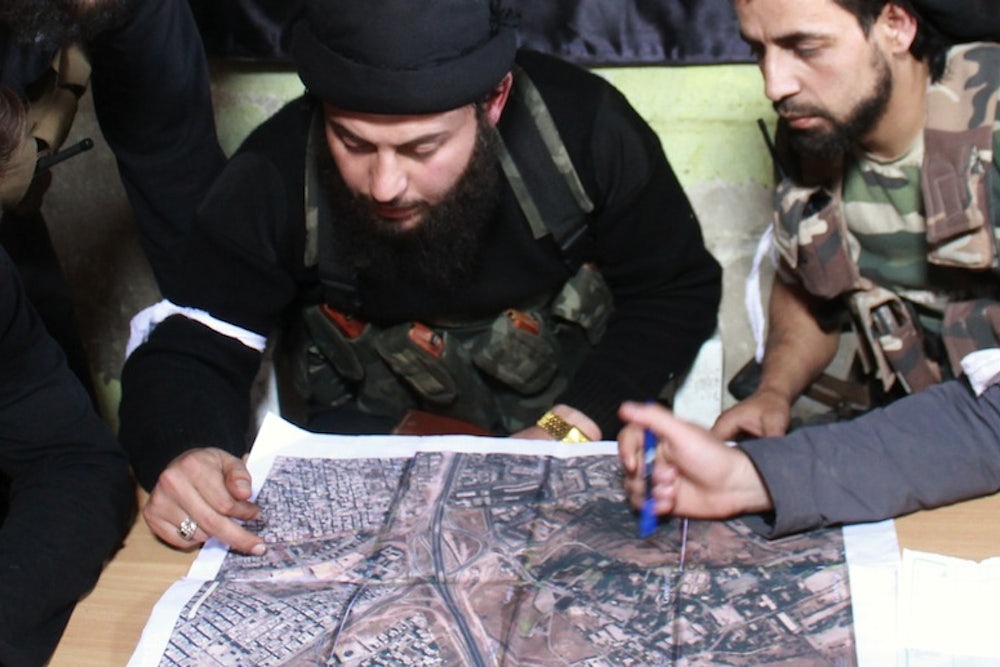In Wednesday’s speech, President Obama surprised some legal analysts by declaring that he would not seek congressional approval to carry out airstrikes against ISIS in Syria and Iraq. He will not toss Congress completely aside, however. Though not mentioned in his speech, senior White House officials said that President Obama will need congressional approval to train Syria’s moderate rebels under Title 10 of the U.S. Code—meaning under the authority of the Defense Department. To those who have followed the Syrian civil war closely, this was also a surprise: After all, the CIA, with the help of allies in the Gulf, has been training and arming the moderate rebels since the spring of 2013.
When the Obama administration initially considered arming and training Syrian rebels last year, White House lawyers warned President Obama to keep a low profile because it could potentially violate international law. Although Obama repeatedly called for Bashar al Assad’s ouster, the U.S. was not at war with Syria. Assad was still the sovereign leader of the country, and aiding the rebels would be akin to backing an insurgency. Lawyers warned that it could resemble President Reagan’s policy of backing the contras in Nicaragua in the 1980s—a move that the International Court of Justice called a “breach of its obligation under customary international law not to intervene in the affairs of another state.” So Obama worked quietly through the CIA, which worked alongsisde allied Gulf countries like Qatar and Saudi Arabia. Although the CIA will not disclose the number of rebels it has trained or armed, the Free Syrian Army chief of staff Gen. Abdul-Ilah al Bashir claims 40,000 rebels are currently receiving support from the U.S. and its partners.
President Obama’s request for Title 10 authority from Congress means the White House wants to shift the operation from a covert CIA endeavor to a public campaign. What’s changed the calculus is, of course, the emergence of ISIS as an actor in Syria and Iraq. Rather than arming an insurgency against Assad, the U.S. can now claim to be supporting Syrians against ISIS in an act of self-defense. While Assad poses no direct threat to the U.S., ISIS has publicly beheaded two Americans and, according to the Obama administration, poses a continued threat to American citizens and personnel overseas. But degrading Assad’s power is still a crucial tenant of Obama’s policy. On Wednesday, White House officials confirmed their intention to “bolster the Syrian moderate opposition to enable it to take and hold ground, pushing out both ISIL and the Assad regime.”
Obama’s decision to shift the Syrian training operation from the CIA to the Defense Department could also indicate that he sees a longer-term role for U.S. advisers in Syria than he did previously. The CIA’s advantage is that it is capable of carrying out small operations quickly, unencumbered by traditional bureaucratic restraints. The Defense Department, by contrast, requires authorization but is more capable of training a large, conventional fighting force. In this case, however, the $500 million Obama has requested from Congress for the Syrian opposition will likely prove inadequate. The U.S. has already spent over $2 billion in Syria, with little effect. It took more than $2 trillion of U.S. spending in Iraq to restore some semblance of a centralized government and military.
From a practical standpoint, arming the Syrian rebels has always carried a high chance of failure. “There are 1,500 militias in Syria that they’re trying to herd like cats,” said Joshua Landis, director of the Center for Middle East Studies at the University of Oklahoma. “The rebels often fight among each other and most are extremely regional and clan or village based. Now, if you give them money and say we’re going bomb ISIS, then you take over, you have militia chaos. You have Libya. You don’t have a state.”
Given these challenges, it makes sense that Obama would want Congress on his side before aiding the Syrian rebels any further. If covert action fails to accomplish its goal, the blame lies squarely on the president who authorized it. Securing Congressional authorization and shifting from a CIA-run operation to the military will allow Obama to say that he was acting transparently, and with the support of the entire U.S. government.
